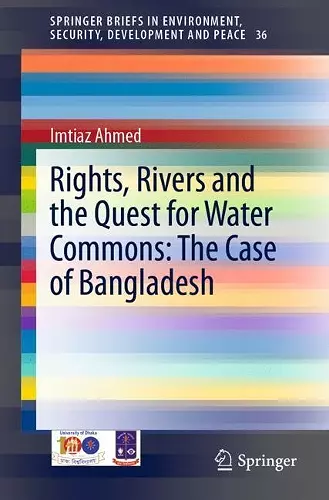Rights, Rivers and the Quest for Water Commons: The Case of Bangladesh
Format:Paperback
Publisher:Springer Nature Switzerland AG
Published:10th Apr '21
Currently unavailable, and unfortunately no date known when it will be back

Right to water may sound novel and somewhat dramatic, yet it has been central to the quest of human civilization for thousands of years. One of the earliest references to water as ‘common property’ can be found in the Jewish laws as early as 3000 BCE.Similar views are also found in Islam. In fact, the Arabic word for Islamic law - shari’ah - originally meant “the place from which one descends to water.”Since water is a gift from the divine to all living beings, sharing water is regarded as holy duty. This is found across religions, regions, societies, and communities, from New Zealand to Nigeria, from Bangladesh to Brazil. But then, what transformed the divine sanction? What led to the negation of the ‘commons,’ with sharing of the riverine water across territorial boundaries suffering the most?The answer probably lies as much as in the politics of safeguarding one’s personal or national interests as it is in the limitations imposed by our disciplinary understanding of things.In this context, a thorough reexamination, even reconceptualization,of some of the core issuesis required.Firstly, the concept of water needs to be understood not as H2O, as it is done in physical sciences,but as H2OP4. That is, the meaning of water in social sciences must include not only ‘twice hydrogen plus oxygen’ but also four P’s - pollution, power, politics and profit. This is not to discount the ‘science’ in the conceptualization of water but rather to add elements central to social sciences.Secondly, the concept of river needs to be redefined and understood not as a carrier of water, as assumedin most of theWestern languages, but as ‘nadi,’ a flow consisting of prana (life), shakti (power), and atman (soul), as etymologically definedin most of the South Asian languages. This comes closer to what critical hydrologists would say, WEBS, that is, a ‘river’ consists of water, energy, biodiversity and sediment. In this light, any fragmentation of transboundary river waterin the name of ‘sharing’becomes an unworkable option, unless of course a mechanism is found to ‘share’the water of the river along with its energy, biodiversity and sediment, and that again, without distorting and harming the life of the river!Thirdly, the subject of ‘water commons’needs to be approached from the standpoint of ‘rights’ of both...
ISBN: 9783030694333
Dimensions: unknown
Weight: unknown
125 pages
1st ed. 2021